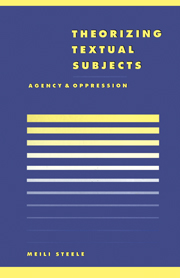Book contents
- Frontmatter
- Contents
- Acknowledgments
- Introduction
- 1 Stories of oppression and appeals to freedom
- 2 Language, ethics, and subjectivity in the liberal/communitarian debate
- 3 Theorizing narratives of agency and subjection
- 4 Truth, beauty, and goodness in James's The Ambassadors
- 5 The subject of democracy in the work of Ralph Ellison
- Conclusion
- Bibliography
- Index
4 - Truth, beauty, and goodness in James's The Ambassadors
Published online by Cambridge University Press: 06 July 2010
- Frontmatter
- Contents
- Acknowledgments
- Introduction
- 1 Stories of oppression and appeals to freedom
- 2 Language, ethics, and subjectivity in the liberal/communitarian debate
- 3 Theorizing narratives of agency and subjection
- 4 Truth, beauty, and goodness in James's The Ambassadors
- 5 The subject of democracy in the work of Ralph Ellison
- Conclusion
- Bibliography
- Index
Summary
In chapter 3, I showed how my model of dialogue helps inform deliberation about women's achievement and oppression; now I will show how extending this model can revivify a canonical modernist text for postmodern ethical dialogue. If my model is to provide a meta-theoretical clarification of the current disputes, it must be able to address the hermeneutic issues posed by these different kinds of texts. I selected The Ambassadors, because it presents a subject with the ethical density of the communitarian subject combined with the diversity and mobility of the liberal subject. Indeed, the central drama of the text is the reconfiguration of the subject around shifting ethical and linguistic practices. This drama of “textuality and ethics,” to recall Martha Nussbaum's phrase, is absent from most contemporary ethical/political discussions in literary theory and philosophy, as we have seen. Nussbaum's work, which bridges the gap between communitarians and liberals and between philosophy and literature, is the most important ethical reading of James's work in recent theory, but it never seeks to rectify the disjunction of textuality and ethics. Instead, she uses James with Aristotle to show the failure of Anglo-American ethical philosophy, especially liberal theory, to characterize ethical deliberation in a richly satisfying way, in a way that can help it address the starting point for ethical reflection: “How should one live?” (Love's Knowledge, p. 23).
- Type
- Chapter
- Information
- Theorising Textual SubjectsAgency and Oppression, pp. 150 - 175Publisher: Cambridge University PressPrint publication year: 1997



